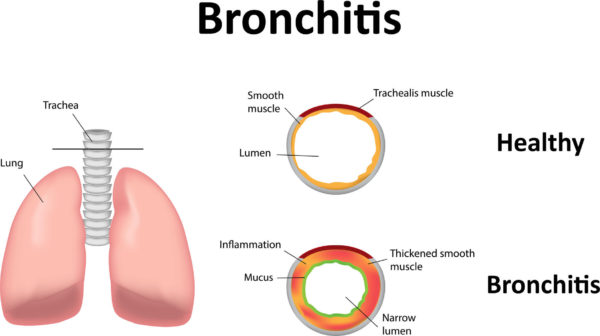It sounds like bronchitis but bronchiolitis is an illness that primarily affects children under the age of 2. Bronchitis affects older children and adults.
Bronchiolitis is a swelling of the bronchioles, the smallest airways in the lungs. It is caused by a virus, oftentimes the same one that causes RSV. Most children recover at home with no medical intervention, but some at-risk children will require a higher level of care.

What are the Symptoms of Bronchiolitis?
Like many other respiratory illnesses, bronchiolitis often begins like a cold with a stuffy nose, slight fever and sore throat. However the illness progresses to a serious cough, difficulty breathing and wheezing. It can take weeks for the symptoms to completely disappear.
Should I Take My Baby to the Doctor?
Most infants will not need to see a doctor for bronchiolitis. Since it’s caused by a virus, antibiotics won’t be effective. However, babies that have these symptoms should be seen by a doctor promptly.
- Vomiting,
- Rapid and/or labored breathing,
- Refusal to drink or eat,
- Lethargy,
- Cyanosis (turning blue around the mouth, nose and fingernails.)
Babies who were born prematurely are especially at risk for severe bronchiolitis.
Other risk factors include exposure to tobacco smoke, heart or lung conditions, weakened immune system and contact with multiple children in a childcare facility or a crowded home environment.
How is Bronchiolitis Treated?
Most babies with bronchiolitis are treated at home and don’t need a doctor’s care.
Antibiotics aren’t effective and bronchodialators, steroids and percussion therapy aren’t recommended.
Unfortunately, bronchiolitis must run its course which often takes two to three weeks.
If your child is feverish, try acetaminophen or ibuprofen. If your child is congested, try thinning the mucus with saline drops or using a nasal aspirator.
Can Bronchiolitis Be Prevented?
Good hand hygiene can help prevent the spread of contagious viruses. You should also prevent your baby from drinking after other children and wash toys and pacifiers regularly. Stay away from people who are sick.
